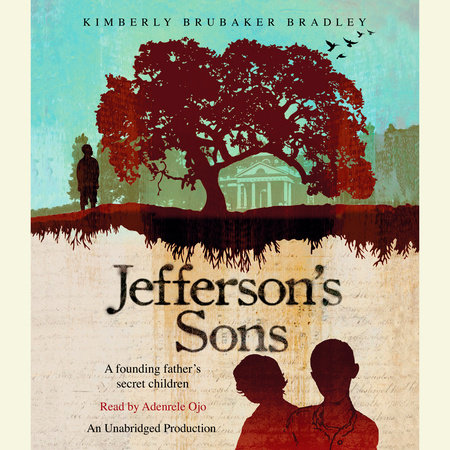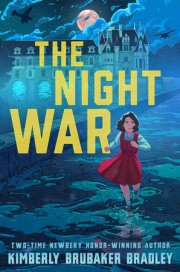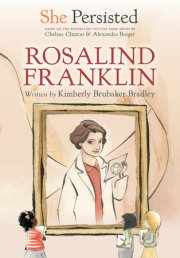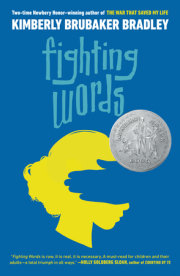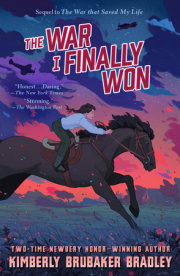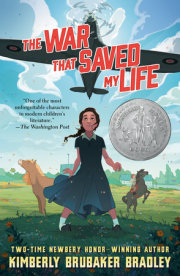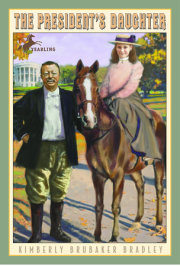When you’re free, you’re free.
“Nobody will ever whip you. Nobody will ever catch you,” Mama said soothingly. “When you’re free, you’ll be just that—free. Not escaped. Free.”
“Why won’t anybody catch us? The white man that caught James Hubbard, he wasn’t from around here. He got paid too, for catching him.”
“Nobody will be looking for you,” Mama said. “You have to be reported as missing for slave catchers to know to look for you. And you won’t be. Your father will let you go. He’ll stay quiet. No one will capture you.”
“We’re supposed to trust Master Jefferson?” Maddy said. Mama nodded. Maddy thought of James Hubbard. He said, “What if Master Jefferson changes his mind?”
“He won’t,” Mama said. She looked at Maddy for a while and then she said, “You don’t have to trust him. All you have to do is trust me.”
Maddy nodded. That, he could do.
OTHER BOOKS YOU MAY ENJOY
Amos Fortune, Free Man Elizabeth Yates
The Apothecary Maile Meloy
The Best Bad Luck I Ever Had Kristin Levine
A Diamond in the Desert Kathryn Fitzmaurice
The Liberation of Gabriel King K. L. Going
The Lions of Little Rock Kristin Levine
A Long Way from Chicago Richard Peck
My Side of the Mountain Jean Craighead George
Saint Louis Armstrong Beach Brenda Woods
To Be a Slave Julius Lester
The War That Saved My Life Kimberly Brubaker Bradley
A Year Down Yonder Richard Peck
Table of Contents
When You're Free, You're Free
Other Books You May Enjoy
Title Page
Dedication
Copyright Page
Spring 1805
Chapter One - The Violin
Chapter Two - Papa
Chapter Three - Run
Autumn 1805
Chapter Four - James Hubbard’s Back
Winter 1805
Chapter Five - Great-grandma and the Sea Captain
Christmas 1805
Chapter Six - Home for Christmas
Summer 1806
Chapter Seven - Joe Fossett
Christmas 1806
Chapter Eight - Hidden in Plain Sight
1807
Chapter Nine - The Lines on the Hearth
Summer 1808
Chapter Ten - A Carpenter’s Apprentice
Summer 1809
Chapter Eleven - Home to Stay
Chapter Twelve - The End of Tranquility
Chapter Thirteen - Nothing
Three Years Later, Summer 1812
Chapter Fourteen - Maddy Learns
Chapter Fifteen - Miss Sally’s Son
Chapter Sixteen - Miss Ellen
Chapter Seventeen - The Mockingbird
Chapter Eighteen - They All Play the Violin
Chapter Nineteen - James Hubbard Flogged Again
January 1813
Chapter Twenty - Maddy on His Own
1813 into 1814
Chapter Twenty-one - A Landau, Septimia, and a Funny Sort of Sweet Potato
Spring 1814
Chapter Twenty-two - Money Musk
Autumn 1814
Chapter Twenty-three - Field-Hand Socks
1815
Chapter Twenty-four - Peter Fossett
Summer 1815
Chapter Twenty-five - The Declaration
1816
Chapter Twenty-six - Master Jefferson Sells James
Spring and Summer 1816
Chapter Twenty-seven - Moving On
Autumn 1816
Chapter Twenty-eight - Poplar Forest
December 1818
Chapter Twenty-nine - Three Months of Grief
Spring 1819
Chapter Thirty - Beverly’s Twenty-first Birthday
Summer 1819
Chapter Thirty-one - Hailstorm
Chapter Thirty-two - Beverly’s Story
Three Years Later 1822
Chapter Thirty-three - The Luckiest Boy
Summer 1822
Chapter Thirty-four - Harriet Turns Twenty-one
Autumn 1822
Chapter Thirty-five - As Long as Master Jefferson Lives
Nearly Two Years Later, 1824
Chapter Thirty-six - Freedom Fighters
1825
Chapter Thirty-seven - Extra
1826
Chapter Thirty-eight - Waiting for the Fourth of July
Early January 1827
Chapter Thirty-nine - Washington, D.C.
January 14 1827
Chapter Forty - The Graveyard
January 15, 1827
Chapter Forty-one - The End
Afterword
Most Useful Sources for Further Study
Most Useful Sources for Further Study
Most Useful Sources for Further Study
Discussion Questions for Jefferson's Sons
An Exciting Preview of The War That Saved My Life
Descendents of Thomas Jefferson
To Bart, Matthew,
and Katie
DIAL BOOKS FOR YOUNG READERS
A division of Penguin Young Readers Group • Published by The Penguin Group
Penguin Group (USA) Inc., 375 Hudson Street, New York, NY 10014, U.S.A. • Penguin Group (Canada), 90 Eglinton Avenue East, Suite 700, Toronto, Ontario, Canada M4P 2Y3 (a division of Pearson Penguin Canada Inc.) • Penguin Books Ltd, 80 Strand, London WC2R 0RL, England • Penguin Ireland, 25 St. Stephen’s Green, Dublin 2, Ireland (a division of Penguin Books Ltd) • Penguin Group (Australia), 250 Camberwell Road, Camberwell, Victoria 3124, Australia (a division of Pearson Australia Group Pty Ltd) • Penguin Books India Pvt Ltd, 11 Community Centre, Panchsheel Park, New Delhi - 110 017, India • Penguin Group (NZ), 67 Apollo Drive, Rosedale, Auckland 0632, New Zealand (a division of Pearson New Zealand Ltd) • Penguin Books (South Africa) (Pty) Ltd, 24 Sturdee Avenue, Rosebank, Johannesburg 2196, South Africa • Penguin Books Ltd, Registered Offices: 80 Strand, London WC2R 0RL, England
Copyright © 2011 by Kimberly Brubaker Bradley • All rights reserved • The publisher does not have any control over and does not assume any responsibility for author or third-party websites or their content. Type set in Minion •
Library of Congress Cataloging-in-Publication Data
Bradley, Kimberly Brubaker.
Jefferson’s sons : a founding father’s secret children / by Kimberly Brubaker Bradley.
p. cm.
Summary: A fictionalized look at the last twenty years of Thomas Jefferson’s life at Monticello through the eyes of three of his slaves, two of whom were his sons by his slave Sally Hemings.
ISBN: 9781101529454
1. Jefferson, Thomas, 1743–1826—Juvenile fiction. 2. Hemings, Sally—Juvenile fiction. [1. Jefferson, Thomas, 1743–1826—Fiction. 2. Hemings, Sally—Fiction. 3. Slavery—Fiction. 4. African Americans—Fiction. 5. Monticello (Va.)—Fiction. 6. Monticello (Va.)—Fiction. 7. Virginia—History—1775–1865—Fiction.] I. Title.
PZ7.B7247Je 2011
[Fic]—dc22
2010049650
Spring 1805
Chapter One
The Violin
It was April and all Monticello was stirring, but in their cabin Mama had just put baby Maddy down to sleep and she told Beverly and Harriet to be still.
Beverly did not want to be still.
Harriet reached under the bed for the box where she kept things and pulled out the sampler Mama was teaching her to sew. Beverly knew what would happen next. Harriet and Mama would talk sewing, and ignore him. He aimed a kick at his little sister. “Don’t do that,” he said. “Let’s do something fun.”
Harriet sat down on the stool beside the hearth. She beamed at Mama with what Beverly called her good-girl smile, like she was trying to show off how sweet she was. Harriet was almost four years old. She was not a sitting-still little girl, but sometimes she took a mood to act like one. Beverly reached out with his foot again. His toe grazed the end of one of Harriet’s braids. Harriet screeched.
“Beverly,” Mama said, not even looking up, “don’t wake your brother.”
“I didn’t yell,” Beverly said. “Harriet did.”
“You’re the one looking for trouble,” Mama replied. “Do you need something to do?”
Beverly knew better than to say yes. Mama would make him do chores. “No, ma’am,” he said. “I guess I’ll go visit Uncle Peter.”
“Don’t you bother him, neither,” Mama said, but she let him go.
Beverly went out the cabin and down Mulberry Row. The spring wind whipped the still-bare branches of the mulberry trees. The packed dirt road felt cool and firm beneath his bare feet. Beverly spread his arms into the wild wind. He felt wild too.
The kitchen was halfway down the row, in the basement of a little brick guesthouse. Uncle Peter, one of Mama’s brothers, was the cook. Uncle Peter didn’t hand out treats very often, but you never knew. It was midmorning. If the folks in the great house hadn’t been hungry at breakfast, there might be muffins left over.
Beverly slid through the open door. On the hearth, Dutch ovens steamed in a row over piles of coals. Uncle Peter and the two girls that helped him stood behind the long table, chopping vegetables. Uncle Peter gave Beverly an eye. “What do you want?” he asked.
“Nothing,” Beverly said. He edged closer to the table. There were muffins left, and slices of ham too.
Uncle Peter whapped Beverly’s hand with the end of a towel. The girls laughed. “Get out of here, Beverly!” Uncle Peter said. “Two hours since breakfast, you can’t be hungry yet!”
“Can too,” said Beverly, but he went.
Outside, the wind still howled. Beverly stopped and thought about what he wanted to do. He was too little to have a real job. Most days he helped Mama while she sewed in the cabin, or visited his aunts and uncles, or ran around the gardens or the orchards. Sometimes he walked with Mama to the great house, where she checked to see that everything in Master Jefferson’s room was all right. Master Jefferson spent most of the year in Washington. When he was gone the great house stood empty. Besides taking care of Beverly and Harriet and Maddy, Mama didn’t have much to do.
Now Master Jefferson was home for a month and everything had changed. He’d brought his grown-up daughter and all her children with him, and invited friends to visit, so the house was full to bursting. Mama worked and worked. What’s more, she stayed up at the great house every night.
Beverly didn’t mind the bustle. But whenever he thought about Master Jefferson, his stomach gave a little twist, almost like he was hungry. It twisted now. He wished Uncle Peter had given him a muffin.
He looked to his left, toward the woodshop. His uncle John worked there, learning fancy carpentry from a white Irishman named Mr. Dismore. Beverly loved Uncle John, and he loved watching him make things out of wood, but he wasn’t sure how he felt about Mr. Dismore. Unlike the overseers, Mr. Dismore was cheerful and funny, but he also sometimes said things like, “I don’t want you pickaninnies hanging around my shop.”
Beverly hated the word pickaninny. It sounded like something you’d stomp on if you saw it running across the floor. He was not, he thought, a pickaninny.
Straight across the road was the smokehouse, locked so the hams couldn’t grow legs and wander away. To the right was the blacksmith’s shop. Beverly often went there to watch the nail boys work. He knew he’d be a nail boy himself when he was older. The nail boys made nails all day long, tap, tap, tap! They cut nail rod into short pieces, then hammered one end of each piece long and pointy and the other square and firm. The nail boys’ muscles stood out on their arms. Master Jefferson was proud of them.
The only problem with visiting the blacksmith shop was Mr. Stewart. He was head blacksmith, a white man, and mean when he was drunk. Lately he stayed drunk all the time. Only yesterday, Master Jefferson’s daughter, Miss Martha, said it was about time she took matters into her own hands and showed Mr. Stewart the door, before he grew careless in his inebriation and burned the blacksmith shop down. She said it was a good thing they had Joe Fossett, or that place would be a ruin.
Beverly’d heard her. He was good at hearing things. “If you’re smart,” Mama often told him, “you’ll keep your mouth shut and your ears open. You’re a smart boy, aren’t you?”
“Yes, ma’am,” he’d say, proud that it was true.
Beverly loved the word inebriation, even though Mama said it was just a fancy name for drunk. Beverly savored beautiful words. They were like music in his head. He didn’t care what words meant nearly as much as how they sounded. He loved it when Mama and Miss Martha spoke French together, even though they only did it so no one else could understand them.
“Teach me,” he begged Mama. “Teach me how to talk like that.”
Mama taught him a song in French, and how to say “I love you, Mama,” but she said she didn’t have time to teach him more, and besides it would upset Miss Martha. No good ever came from upsetting Miss Martha.
Miss Martha’s full name was Mrs. Martha Randolph. She was the only one of her mama’s children still alive. She loved to come to Monticello and act like the boss of everything. But she wasn’t the real boss—Master Jefferson was—and she wasn’t there very often. Beverly didn’t care if he upset her or not. When he said so, Mama shook her head. “Trust me,” she said. “It’s better to stay on her good side.”
“Does she have a good side?” asked Beverly.
For a moment Mama looked like she might laugh, but then she set her lips together and told Beverly not to act like he was too big for his britches. She said everyone had a good side, even if with some folks you had to look mighty hard to find it. She told him again that smart boys kept their mouths shut, was Beverly listening?
Beverly was. He wondered where Miss Martha kept her good side. On the sole of her left foot, maybe, safe inside her shoe.
Miss Martha was two years older than Mama. Once upon a time, after Master Jefferson’s wife died, but when Miss Martha was still just a girl, Master Jefferson and Miss Martha went to live in France. After a few years they sent for Master Jefferson’s other daughter, Miss Maria, who was still alive back then, but little and scared. Beverly’s mama was just fourteen years old, but she got the job of taking Miss Maria on a ship across the wide ocean to France. They all lived in Paris for three more years. That was where Mama learned French.
Miss Maria grew up, married a nice man, had a son, and died. Mama told Beverly that. Miss Martha grew up, married a loud, angry man, and had too many children. She walked around looking like she’d just tasted sour milk. Mama didn’t have to tell Beverly that; he could see it for himself.
Beverly had two dead sisters and one dead brother. He couldn’t remember any of them, but Mama told him and Harriet about them because she said it was important to keep their stories alive. Family counted, living or dead.
Baby Madison seemed healthy, Mama said, but you never knew for sure. One of the dead sisters had lived for over a year, walked and talked and everything.
Beverly looked out over the blacksmith shop, past the gardens and down the mountainside. He sighed. There was only one place he wanted to go. He knew it, and he might as well go there. He lifted his chin and tried to look like a boy with an important errand to do, not one sneaking off where he didn’t belong.
He went to the great house.
It was in pieces. It had been a fine big house, but not fine or big enough to suit Master Jefferson. He’d hired workmen to rip the walls open and add rooms off the long sides, and remove the roof to add a third floor. Right now the work was about half-finished; to live there you had to not mind dust and dirt and no roof and holes in the walls. Master Jefferson didn’t mind. Miss Martha did, but she was there anyway, because she preferred a house with no roof away from her husband to one with a roof and her husband inside.
Beverly’s grown cousin Burwell was the butler whenever Master Jefferson was at home. Burwell hated mess even more than Miss Martha did, but he didn’t have any say. He just had to cope the best he could. Master Jefferson expected a fancy dinner on a clean tablecloth with china and silver and lots of good wine, every afternoon at exactly three o’clock, whether there was a roof over the house or not. Burwell always managed to make everything right.
I’ll go see Burwell, Beverly told himself. He’ll let me polish spoons. But he knew Burwell wasn’t the person he wanted to see.
He slipped between the poplar trunks supporting the unfinished porch roof and through the back door into the great house. Upstairs a baby wailed. Beverly heard footsteps hurrying across the hall. Burwell’s dining room was to the left, but Beverly turned right.
There in front of him stood a wide-open door.
Beverly stared. His breath came quick with happiness and surprise. It was open—the door to Master Jefferson’s room was open! Beverly’d been inside many times with Mama, but never, ever when Master Jefferson was home. When Master Jefferson was home, he kept the door locked. He did not want his papers or books or self disturbed. Only Burwell and Beverly’s mama had keys to the door. Even Miss Martha had to stay out.
Beverly peeked inside. Nobody. The fire had burned down, but a new pile of wood waited by the swept hearth, so Beverly knew Burwell had come and gone. The curtains at the open windows fluttered in the breeze.
Beverly took a cautious step. The room sure looked different with Master Jefferson home. When he was gone Mama kept the desk swept bare and all the books shut up safe in cabinets behind glass. Now piles of books covered the floor and tables. Some had scraps of paper or ribbon sticking out of their sides, and one lay upside down on the polished wooden desk, with half its pages cut, and the paper knife lying beside it.
Then Beverly saw, beside the half-cut book, the violin.
He sucked in his breath, fast. His heart hammered. Oh, that violin! How he loved the sound of that violin! Master Jefferson had brought it with him from Washington, and sometimes in the evenings Beverly could hear its music all the way down Mulberry Row, sharp quick notes, long dancing bits, ta-dum-dum-ta-dee. He had never heard anything like it. Better than inebriation or the sound of words in French was the glorious music from Master Jefferson’s violin.
Beverly crept forward. He’d never seen a violin up close before. Now he stood over it, admiring the shiny honey-colored wood. Next to it was the stick thing you drew across the strings. Beverly reached out and touched the stick, just once. His fingers kept moving and brushed the smooth wood of the violin itself. He thought he could feel the music inside.
Right on the bottom was the dark spot where you were supposed to put your chin. He’d watched Mr. Jefferson through the open windows one night.
Quick as a flash, before he could think hard enough to make himself stop, Beverly tucked Master Jefferson’s violin beneath his chin. He pushed on the strings beneath the fingers of his left hand, and curled his right hand around the stick. He told himself not to make a sound. Burwell would hear—Miss Martha would hear—he would be in a heap of trouble, and Mama would be upset. But he couldn’t stop. He raised the stick in the air.
Right behind him a soft voice said, “You’re not holding the bow right.”
Beverly jumped. His hand clutched the violin. He knew that voice. Master Jefferson. Beverly’s heart beat faster; his mouth went dry from hope and fear. He wanted to set the violin down, tell Master Jefferson he was sorry, and run home as fast as his legs would go, but he couldn’t move. His feet had frozen to the floor.
Master Jefferson’s smooth, long-fingered hand came from behind Beverly, and carefully covered Beverly’s hand on the stick—on the bow. Master Jefferson plucked at Beverly’s fingers to loosen their grip, and then curved around them. Master Jefferson held the bow like it was something alive.
His other hand covered Beverly’s hand on the strings. Softly he drew the bow across the strings. It made a sound.
Master Jefferson said, “Hold it gently. You’ve got to coax the music out.”
Beverly turned and looked up at him. The last time he’d been close to Master Jefferson had been at Christmas, months ago. Master Jefferson was tall and thin and loosely put together, his joints floppy like the ones on Harriet’s wooden doll. His gray hair hung untied around his shoulders. He wore old gray breeches and a red waistcoat Beverly’s mama had made last year.
“Hello, Beverly,” he said.
“Hello,” Beverly whispered.
“How old are you now?”
“Seven,” Beverly said. “Seven years and one day. Yesterday was my birthday. April first, that’s the day I was born.”
“I remember. Happy birthday.” Master Jefferson smiled. The lines around his eyes crinkled. “It’s good to see you again. I like having children around. In Washington Miss Martha’s been keeping house for me, and her children stay with us there.”
“They’re here now,” Beverly said.
“Yes,” said Master Jefferson. “Aren’t I lucky?”
“But Miss Edith and the new baby had to stay behind.”
Master Jefferson raised an eyebrow. “Miss Edith?”
“Miss Edith,” Beverly said, “that went with you to Washington.” Master Jefferson looked puzzled, so Beverly explained. “Miss Edith that’s married to the blacksmith, Joe Fossett. Miss Edith that lives with you. She just had a baby, right before Mama had Maddy, and it was a boy and they named him James.”
“Oh. You mean Edy? The cook? My apprentice cook?”
“Yes, sir.” Beverly nodded. “Joe Fossett’s real sorry they didn’t come home with you. He understands, ’cause the baby’s so little, but he wanted to see them. He misses them. We all do.”
“I see.” Master Jefferson pulled a chair closer and sat down. He turned Beverly around to face him and held him lightly between his knees.
Beverly smiled. He touched the side of Master Jefferson’s face. “Your eyes are gray,” he said. “Just like my baby brother’s. Maddy has eyes just like yours.”
“Is that what you’re calling him?” Master Jefferson sounded amused. “Maddy?”
“Yes, sir.”
“His name is James Madison. He was named after the patriot James Madison, a good friend of mine.”
“Yes, sir. Mama said so. But she calls him Madison so we don’t get him mixed up with Miss Edith’s baby James, and Harriet and I call him Maddy because Madison’s too long to say.”
“I see. And do you call Harriet Harry?”
“No, sir,” Beverly said. “She smacks me if I do.”
Master Jefferson laughed. “You don’t smack her back, I hope.”
“No, sir,” Beverly said. “Mama said I can’t ’cause she’s littler than me, and a girl. But it’s not fair. She’s little, but she hits hard.”
“Little sisters are never fair,” Master Jefferson said.
Beverly thought about this. “Do you have a little sister?” he asked.
“I do. I had four of them when I was growing up.”
“Did they smack you?”
“I don’t recall.” Master Jefferson poked the top of Beverly’s nose. “But I do know that I never, ever smacked them back. Neither must you. A gentleman never hits ladies. Nor sisters either.”
Master Jefferson had patches of sunburned skin on his cheeks, and a dark spot on his waistcoat that looked like ink. Beverly touched it.
“Mama’ll have a job getting that out,” he said.
Master Jefferson looked at the spot too. “I write so many letters, I’m always covered in ink.” He looked back at Beverly. “So, why are you here? Did your mama give you a message for me?”
Beverly bit his lip. He wished he could say yes. “No, sir.”
“Did Burwell, or someone else?”
“No, sir. I just sort of came by myself.”
“My bedroom’s private. Do you know what that means?”
“Yes, sir. It means I’m supposed to stay out.” Beverly took a deep breath. “I just wanted—I wanted to see—” He looked around. How much could he say? His hand came down on the violin.
“You wanted to see the violin?”
“Yes, sir,” Beverly said. It wasn’t all of the truth, but it was a piece of the truth. “I love this violin.”
Master Jefferson looked surprised. “You do?”
“Yes, sir,” said Beverly. “I like—I sure like to listen to you play.”
Master Jefferson held up his right hand and slowly flexed his fingers. “I used to play for hours on end,” he said. “A long time ago. I played in string quartets before the war. But I broke my wrist; it doesn’t bend very easily, and it aches after a while. So I don’t play as often or as well. You know about the war, don’t you? The Revolution? How we started a new country?”
“No, sir,” Beverly said.
“You must learn about it. It’s important. We broke away from England and . . .” Master Jefferson paused, and smiled again. “You’re young, I forget. My grandchildren don’t understand it yet either.”
He lifted the violin and set it into place beneath Beverly’s chin. “But seven years old might be old enough for this. Give it a try. Be gentle.”
Beverly didn’t know which strings to push or how hard to push them, but he moved the bow the way Master Jefferson had. The violin screeched. Beverly stopped. “Did I break it?” he asked, alarmed.
Master Jefferson laughed. “No. It always sounds like that at first.” He seemed to be thinking about something. After a moment he asked, “Are you a hard worker? Would you work to learn to play the violin?”
Beverly’s eyes widened. “Oh, yes! Yes, sir!”
Master Jefferson smiled. He cupped his hand around Beverly’s face, so quickly Beverly barely felt it, then rose and went to a cabinet built into the wall. He came back with a small wooden case. “I have several violins,” he said. “The one you’re holding is my best. Italian. It’s not an instrument for a boy. But this one”—he took the Italian violin away and put the case he was holding into Beverly’s hands—“this is what they call a kit violin. You can strap this onto the back of a horse to travel and bounce it around without hurting it. It doesn’t sound as pretty as the Italian violin, but it’s a good deal harder to break. Mind, you’ll still have to be careful.
“I’m going to give you this violin,” he continued. “Do you know Jesse Scott, down in Charlottesville?”
Beverly nodded. Jesse Scott’s wife was Joe Fossett’s sister.
“He’s a good fiddler, and a good teacher,” Master Jefferson said. “You go down to him with this violin, and tell him I said he’s to give you lessons. Once a week. And in between you practice. I’ll expect to hear progress by the time I come back here this summer. All right?”
Beverly clutched the wooden case tight to his chest. He swallowed hard. “Sir?”
“What’s wrong? You need lessons, in order to learn.”
“Yes, sir, but—” Beverly bit his lip. “Couldn’t you teach me?”
Master Jefferson looked away. “No,” he said. “Jesse will suit you better.”
“Yes, sir.” Beverly knew he shouldn’t have asked.
Master Jefferson patted his back. “Go on home. Your mama will be wanting you, and I have work to do.”
Beverly was halfway to the door when Master Jefferson spoke again. “Beverly—”
Beverly turned.
“Do you know who I am?”
“Yes, sir,” Beverly said. He smiled. “You’re the president. President of the United States. Mama says it’s a very important job.”
An odd expression flitted across Master Jefferson’s face. For a moment he almost looked sad. Beverly wondered if he’d said the wrong thing. But the look faded. Master Jefferson said, “That’s right. You go on home.”
Beverly walked quietly out of the great house, but as soon as his feet hit dirt he ran. He tore into the cabin and didn’t care if he woke the baby, not one bit.
“Mama, Mama!” he shouted. “Papa gave me a violin!”
Chapter Two
Papa
Mama wheeled about, angry. She said, “Don’t you call him Papa.”
“But—” Beverly danced up and down, waving the violin. “I’m going to take lessons, from Jesse Scott, and he gave me the violin, Papa, he really did, and when he comes back in the summer—”
“Don’t you ever call him Papa,” Mama said. “Do you hear me?” She shook her finger at him. Mama never messed around.
“Yes, Mama,” said Beverly. “But—”
“But nothing,” Mama said.
Beverly looked at the floor. “But you said he’s my father. You said so.” Mama had, a week ago. Beverly’d had that buzzing feeling in his stomach ever since. He had wondered if it could possibly be true. Now he had a violin to prove it.
Mama said, “What you know in your head and what you can say out loud are not always the same. You know that—”
“You’re not stupid,” chimed Harriet. Beverly glared at her. Mama had told Harriet about their father too. Beverly wished she hadn’t.
“I don’t ever want to hear you call him Papa,” Mama said. “Not to me, not to Harriet, not to anybody. Is that clear?”
“Yes, ma’am.”
“Good. Now, show me this violin.” She took Beverly on her lap and helped him open the case.
Beverly snuggled against her. “He gave it to me,” he said. “To keep.”
Mama kissed him. “It’s a fine thing, to learn to play the violin.”
“He wants me to,” Beverly said. “He said.”
When Mama told Beverly that Master Jefferson was his father, she called it a secret everybody knew.
“Everybody in the world?” he asked.
“No,” Mama said. “Everybody at Monticello. The folks in Charlottesville whisper about it. Some people spread talk farther away, but we don’t need to worry about them.”
Beverly nodded because he thought Mama expected him to, but he didn’t understand.
Mama said Master Jefferson was president of the entire country, which was so big, a single person could never see it all, not if that person traveled all his days. She said Master Jefferson was a very important man. Beverly already knew that. He was proud to learn he had an important man for his father. He didn’t understand why it had to be a secret.
“Because I say so,” Mama said. She sighed, and brushed his hair back from his forehead. “You’re maybe too young to know. I shouldn’t have told you, maybe. But if you’re old enough to ask, I figure you’re old enough to hear the truth.”
He wouldn’t have thought to ask about his father if not for Joe Fossett. A few days before Master Jefferson came home, Davy Hern, the wagon man, arrived with a load of goods from Washington. Davy always brought Master Jefferson’s heavy luggage ahead. As he made the last turn onto Mulberry Row, Davy let out a big halloo, and folks came running from everywhere to hear his news. Beverly dashed out his cabin door. He saw Joe Fossett come out of the blacksmith shop and take three big steps toward the wagon, and then Beverly saw the light go out of Joe Fossett’s face. It was like somebody snuffing a candle.
“She didn’t come?” Joe Fossett said. He ran up to the wagon and grabbed Davy’s arm. “Where’s Edith? Why didn’t she come home? Is she all right? What about the baby?”
“They’re all right,” Davy said. “They’re fine. Baby’s healthy. Nursing fine. Edith thought four days of travel might be too much for them, though, in this wet weather. She said to tell you she’s sorry, and she and James’ll see you in July.”
Joe shook Davy’s hand, and went back to the shop before old Mr. Stewart could kick up a fuss. Beverly helped unload the wagon. He thought about that look on Joe Fossett’s face, that joy snuffed cold.
He waited until nighttime, when Harriet was asleep and Mama was stroking his back. Then he told Mama all about it. “Why was Joe Fossett sad?”
“He misses Miss Edith,” Mama said. “He wants to see his baby boy. He expected they’d come home.” After a pause she said, “It’s hard for families and mamas and daddies to be apart.”
Beverly thought of his family—Harriet snoring beside him, and Maddy making little baby noises from the cradle. Mama sat on the chair beside the bed, but later, when she got tired, she’d crawl in with him and Harriet. It was such a nice night, the fire crackling low. Beverly didn’t think they needed a daddy.
“Anyway,” he said, “I haven’t got one.”
“Haven’t got what?” Mama asked.
“A daddy,” he said.
Mama laughed. “Of course you do. Everybody’s got a daddy.”
“Do not,” said Beverly.
“Every living thing,” Mama continued. “Every cow in the field. Every chicken’s got a daddy. So do you.”
“Well, who is it, then? He doesn’t live around here. Is he dead?”
Mama’s hand stopped stroking Beverly’s back. “He lives here sometimes. He’s not dead.” After a pause she added, “Your daddy’s Master Jefferson.”
Beverly sat straight up. “Mama! Are you sure?”
She laughed again. “Yes. I’m sure. Hush, you’ll wake Maddy.”
“Who’s his daddy? Who’s Harriet’s?”
“Master Jefferson. All my children have the same daddy.” Mama pushed him back down. “But you listen, Beverly. It’s a secret. You mustn’t talk about it, except to me. Not to anybody. If you have questions, you ask me and I’ll answer you, but I don’t want you talking about it outside this room. Promise.”
“Why?” asked Beverly.
“’Cause I said so,” said Mama.
“He got more children around here?” Beverly asked.
“No,” Mama said. “Just you three. And the ones I had that died. And Miss Martha, of course. And Miss Maria, and the other babies his wife had, but they all died a long time ago.”
“Can I tell Joe Fossett?” Beverly asked.
“No, sir. You may not.”
“Uncle Peter? Uncle John?”
“No.”
“Nobody?”
“Nobody, Beverly. You promise me.”
“What about Miss Martha?”
Mama pushed her lips together. “I’m not joking, Beverly. I told you this, and I’m telling you not to speak about it. Especially not to Miss Martha. You’ve got no business talking to Miss Martha anyhow.”
Beverly considered. He had never thought much about his father before. Some people had daddies around, and some didn’t, that was all. He’d never thought his daddy could be Master Jefferson. “Doesn’t nobody know?”
“Doesn’t anybody,” Mama corrected. “Yes. Lots of people know, but we can’t talk about it.”
“Mama,” Beverly said, “that doesn’t make sense.”
“It will when you’re older,” Mama said.
Beverly thought hard. He’d heard people say how sad it was that Master Jefferson had only old Miss Martha left, out of all his children. Now here was Beverly, and Harriet, and Maddy. That wasn’t sad at all. “Mama? Why don’t we tell people? Maybe some people would be glad to know. Miss Martha—”
Mama sighed. “Miss Martha and Miss Maria were the children of Master Jefferson’s wife. I’m . . .” She paused.
“Won’t he marry you?” asked Beverly.
“He can’t,” Mama said, after a second silence.
“Why not?”
Mama sighed again. “A black person can’t marry a white person. A slave can’t marry at all.”
This was news to Beverly. “Are you a slave, Mama?”
“Yes.”
“Am I?”
“We’ll talk about that later,” Mama said.
“Are Harriet and Maddy—”
“Later,” Mama said. “You’ve had enough talk for the one night.”
Beverly tried to hold silent, but finally he had to say, “Then Joe Fossett, he’s not a slave.”
“How do you figure?” asked Mama.
“’Cause he’s married,” Beverly said. “He’s married to Miss Edith.”
“Yes and no,” Mama said. “Joe and Miss Edith pledged to each other. They’re married, but not by law. They’re married in their hearts. Joe and Miss Edith—they’re both slaves. We’ll talk about it later, all right?”
“Are you married to Master Jefferson in your heart, Mama? Like Joe and Edith?”
“Oh, Beverly,” Mama said.
“Are you?”
“Of course I am,” Mama said. “Now go to sleep.”
In the morning Beverly thought of another question. “Does he love me, Mama?” he asked. “Does he love me like Joe Fossett loves baby James?”
Mama smiled at him. “Of course he loves you,” she said. “He named you. William Beverly, after a friend of his father’s. And you’ll see. Someday you’ll have a fine life, because of him.”
The very next day Master Jefferson came home. Beverly hoped Master Jefferson would come to their cabin right away, but he didn’t. He hoped Master Jefferson would let them all sit down to dinner with him and Miss Martha, but he didn’t.
But then Master Jefferson gave Beverly a violin. So Beverly knew what Mama said was true.
Mama spent nights in the great house with Master Jefferson. A big girl named Fanny Gillette came each evening to stay with Beverly and Harriet and Maddy. Maddy was an easy baby and usually slept until morning; when he did wake before Mama returned, Fanny dipped a cloth in sugar water and let him suck on it. Maddy always woke up hungry, but other than that he was too little to mind Mama being gone, and Harriet slept so hard she barely noticed, but, after he got his violin, Beverly didn’t like it at all.
“I wanted to sleep in the great house with you,” he told Mama.
“Can’t,” Mama said, without a trace of a smile.
“I don’t see why not,” Beverly said. “Even if the bed up there is little. I wouldn’t mind.” He stomped his foot. Throwing a fit didn’t usually budge Mama, but you never knew.
Mama grabbed his arm, hard. “Don’t go down that road,” she said. “I told you it was a secret, about you and Master Jefferson. It’s a secret about me too. That I go up there at night. What kind of secret would it be if I took you and Harriet and Maddy along?”
“It can’t be a secret,” Beverly argued. “Fanny comes here—everybody on Mulberry Row knows that. And Burwell lights the fires every morning. And Miss Martha sleeps right upstairs.”
“Miss Martha doesn’t know anything,” Mama said. “Nor Burwell neither. Master Jefferson lights his fire himself in the morning. Burwell’s not allowed into the room until after breakfast.”
Beverly knew this didn’t make sense. Burwell was sure to know about Fanny even if he didn’t know anything else. But Mama looked so fierce Beverly kept quiet. Mouth shut, ears open, that was what Mama said.
A few days later, Beverly said, “I’ve been studying Miss Martha, Mama. She’s not stupid.”
Mama shook her head. “Don’t study her. She’s not stupid, but she only sees what she wants to.”
Beverly thought about this. “She doesn’t want to be my sister, does she?”
“No,” Mama said. “She does not.”
“But she is my sister, isn’t she?”
“She is,” Mama said. “But she won’t ever admit it, not this side of heaven. If you’re smart—and I know you are—if you’re smart, you’ll leave Miss Martha alone.”
“Doesn’t she like you, Mama?”
Mama sighed. “She likes me fine. She doesn’t like—I don’t know the words for it. She’ll never admit she’s kin to us, let’s leave it at that.”
Beverly tried to play his violin on his own, but he couldn’t make it sound right and he was a little afraid he might break it. He thought he’d die of impatience before Mama finally took him down to Charlottesville to see Jesse Scott.
Mama waited for a day when Davy Hern had business in Charlottesville, so she and Beverly could get a ride in the wagon. It was a pretty morning, soft and warm, and all the leaves on the mountainside were just popping out. In the woods the redbuds bloomed. The wagon circled slowly down, and Beverly, his violin on his lap, felt too happy to speak. He would learn to play beautiful music. He would make his father proud.
Jesse Scott was a kind, friendly man. When Beverly made the violin squawk and screech, Jesse laughed. He taught Beverly four notes, one for each string. He told Beverly to practice a little every day. “But not too much,” he said, “or you’ll drive your mama crazy.”
“Master Jefferson used to practice for hours,” said Beverly.
“When you’re older you can practice for hours,” said Jesse. “Right now you can practice a little each morning, and a little each night. Come back for a lesson next week if you can.”
Mama told Jesse to keep track of Beverly’s lessons and send Master Jefferson the bill. Beverly beamed.
He practiced as much as Mama would let him. He played for Mama, Harriet, and Maddy. He played for Joe Fossett in the blacksmith shop, Uncle John in the woodshop, and Uncle Peter in the kitchen. More than anything, he wanted to play for his father. He waited for Master Jefferson’s door to be open again, but it never was, and pretty soon both Mama and Burwell started shooing him out of the great house every single time they saw him there. They sent him on errands to the stables or gardens and kept him busy all day long.
“You need to stay away from the great house,” Mama told him.
“I need to see Papa,” Beverly said. “I need him to hear me play.”
“Don’t call him Papa,” Mama said. “You call him Master Jefferson, you hear me? Same as everybody else.”
“I’ll only call him Papa to you.”
“No, you won’t,” she said. “You’ll forget and let it slip sometime.”
Beverly said, “I don’t see why it has to be a secret.”
Mama bent over him, sparks of anger flashing in her eyes. “I don’t care whether you understand it or not,” she said. “I care whether or not you obey me. You keep your mouth quiet or I’ll give you something to help you remember. Now put that violin down and go help Uncle Peter with the dishes.”
Beverly didn’t move. Mama pointed to the door. “Go.”
“I need him to hear me,” Beverly said. “Please.”
“Go,” she said.
Beverly went. But later, after dinner and just before Mama left for the night, she called him over to the cabin door. “Stand just here, in the doorway, and play your notes. Master Jefferson said he’d stand by his bedroom window and listen.”
Beverly could see the open window, and the thin white curtains softly fluttering against it, but he couldn’t see through the curtains into the dark room.
“Is he really there, Mama?”
“This is the only chance I’m giving you. Play.”
Beverly played his best. It sounded like music, even though it was only four notes. Then he waited, watching the curtains. They fluttered once more. Maybe Master Jefferson was waving to him.
“Did he like it, Mama?” Beverly asked the next morning.
“He did,” Mama said.
“What did he say?”
Mama sighed. “Let it go, Beverly. Let it be.”
A week later Master Jefferson returned to Washington. Mama stayed home at night. Everything went back to normal, until one of the nail boys, James Hubbard, ran away.
Chapter Three
Run
James Hubbard was a big boy with heavy arms and a fierce temper. He was smart and hardworking, and Beverly admired him. So did Master Jefferson. A few years back Master Jefferson gave James Hubbard a fancy red suit of clothes as a reward for making the most nails of all the nail boys over an entire year. James Hubbard still wore his red shirt sometimes.
Joe Fossett broke the news. It was dinnertime. Beverly was sitting on one of the long benches in the kitchen, between Harriet and Fanny, eating a bowl of stew. Field hands cooked for themselves in their own cabins, but mountaintop people ate their meals in the kitchen in one big noisy group.
Joe Fossett came through the door, looked around, and cleared his throat, loudly and on purpose. Suddenly, before Beverly could understand why, the entire room went still.
Uncle Peter raised an eyebrow. Joe Fossett turned and checked that the kitchen door was latched tight behind him. You never knew when an overseer might come in. Then Joe turned back and said, “James Hubbard’s run.”
Nobody moved. Beverly stopped his legs swinging. He heard Fanny catch her breath. Joe said, “He didn’t come to the shop this morning. Stewart sent a boy to fetch him. Cabin was empty. All his things were gone.” Joe shrugged and took a bowl of stew from Uncle Peter. “That’s what I know. He’s gone.”
Beverly started to ask where James had gone, but Fanny smacked him. “Hush,” she said, so fiercely that Beverly obeyed.
All afternoon he felt sick and strange. If he hadn’t known James Hubbard was gone, he probably wouldn’t have noticed, but he did know, and he couldn’t stop thinking about him. What did it mean, “run”? Where had he run to? Why?
In the cabin that night, Mama said, “The less said, the better.”
“Why?” Beverly asked. Harriet wanted to know too.
“Might be some folks know more about James Hubbard than they’re letting on,” Mama told them. “Might be some folks around here helped him. We don’t want to know. It’s better if we all stay quiet.”
“But, Mama,” Harriet said. “Where’d he go?”
“To freedom,” Mama said.
“Where’s that?” Beverly asked.
“Depends,” Mama said. “For James Hubbard, it’s pretty far away.”
All that week no one so much as whispered James Hubbard’s name. It was as though he’d never even lived. The silence made Beverly feel quivery inside. Then one of the overseers, the new one, came up through Mulberry Row. He called all the workers together, even making Harriet fetch Mama from the great house. “Jamie’s in jail,” he said. “He didn’t get far.” The overseer held up a scrap of paper. “Which one of you wrote this?”
Nobody moved. “Anybody? Any of you all? I know some of you can read. Some of you must be able to write.” The man waved the paper in the air again. “This here is a forged pass,” he said. “Jamie was carrying it. Too bad he can’t read, because he’d have known what a piece of trash it was. It’s the worst-spelled mess of a fake pass I ever saw. Wouldn’t have fooled a white man’s dog. Just so you all know. I find out one of you wrote this pass, I’ll have you whipped alongside Jamie. You hear?”
He crumpled the pass in his hand, dropped it onto the ground, and strode away.
Harriet pulled Mama’s skirt. “Who’s Jamie?” she whispered.
“James Hubbard,” Mama said. “Jamie’s just what the overseer calls him.”
The overseers nosed around Charlottesville and pretty soon the details came out. Beverly learned them in bits and pieces, by listening in the kitchen to Davy Hern and Joe Fossett and others who traveled and could pick up news.
James Hubbard had worked for pay on his own time, which meant Sundays and late at night. He’d cleaned out privies and burned wood for charcoal, nasty jobs, but the only work he could get for cash. He spent some of the money on real breeches, a fancy shirt, and a coat, to replace the loose pants and long shirt that would have identified him as a slave. He spent the rest—five whole dollars, Joe Fossett said—to bribe one of the overseers’ sons to write him out a fake pass. The boy was a poor scholar. He spelled the words on the pass wrong. The first person James Hubbard showed his fake pass to had had him arrested.
Five dollars! A year of cleaning out privies earned six. Beverly imagined working that hard for a piece of paper the overseer could just crumple in his hand. He didn’t know anything about passes. He’d never heard of them before.
Mama explained in the cabin that night. If you were a slave, you were not supposed to travel anywhere without either a white person or a pass. When Davy Hern went by himself to Washington, he carried a pass signed by Master Jefferson that said who he was and what he was doing. “What about in Charlottesville?” Beverly asked.
“In Charlottesville everyone knows Davy Hern,” Mama said. “They won’t bother him. Anywhere else he goes, he’d better have a pass.”
A slave caught without a pass was thrown in jail. Black people who weren’t slaves had to carry papers saying they were free.
Beverly stared at Mama. He’d never heard of free papers either. “Even Jesse Scott?” he asked.
“Even Jesse Scott,” Mama said.
. All rights reserved. No part of this excerpt may be reproduced or reprinted without permission in writing from the publisher.

